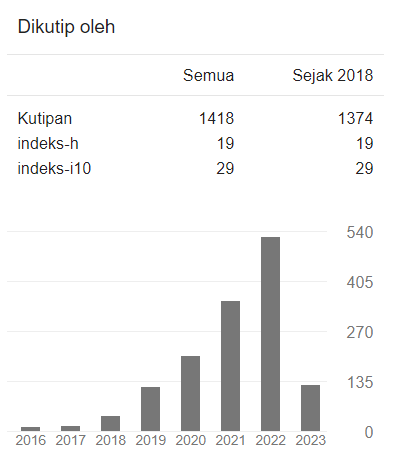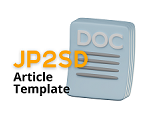Pola Kemampuan Literasi Digital Guru: Menelaah Kesenjangan Literasi Digital dari Perspektif Gender
DOI:
https://doi.org/10.22219/jp2sd.v12i2.34862Keywords:
Literasi Digital, Gender, Sekolah DasarAbstract
This research examines the digital literacy skills of elementary school teachers from a gender perspective, comparing male and female teachers in their implementation of digital literacy in learning activities at SD Muhammadiyah 1 Sidoarjo. SD Muhammadiyah 1 Sidoarjo has integrated digital technology into its learning activities, in line with its slogan, "Islamic and Digital School." This makes it an appropriate setting to investigate whether the educators possess the necessary digital literacy skills and effectively apply them in their teaching practices. The research employs a qualitative approach, producing descriptive data in the form of written or spoken words and observable behaviour using various natural methods. The study specifically focuses on the digital literacy skills of teachers from a gender perspective at SD Muhammadiyah 1 Sidoarjo. The findings indicate that the school's environment and classrooms are consistent with its vision, mission, and slogan of "Islamic and Digital School" in realizing and implementing digital education. Additionally, both male and female teachers demonstrate very good digital literacy skills. Based on data analysis from interviews and questionnaires, it can be concluded that the digital literacy skills of teachers, regardless of gender, fall into the "very good" category and align with the digital literacy indicators set by the Ministry of Communication and Information Technology (Kominfo). The final results of the study show that there is no gender bias in the digital literacy skills of teachers at SD Muhammadiyah 1 Sidoarjo.
Downloads
References
Acep Ruswan, Primanita Sholihah Rosmana, Annisa Nafira, Hanie Khaerunnisa, Ighna Zahra Habibina, Keysha Kholillah Alqindy, Khomsanuha Amanaturrizqi, W. S. (2024). Pengaruh Penggunaan Media Pembelajaran Berbasis Teknologi dalam Meningkatkan Kemampuan Literasi Digital Siswa Sekolah Dasar. Program Studi Pendidikan Guru Sekolah Dasar, Universitas Pendidikan Indonesia, 8(1), 4007–4016. https://doi.org/10.31004/jptam.v8i1.13009
Adhiana, V. I., Yuniawatika, Y., Ahdhianto, E., & Wantoro, J. (2022). Interactive Media Development Using Articulate Storyline-Based Instructional Games for Teaching Fractions. Profesi Pendidikan Dasar, 9(1), 15–27. https://doi.org/10.23917/ppd.v9i1.16927
Ain, N., Novianti, R., Solfiah, Y., & & Puspitasari, E. (2021). Analisis Kemampuan Literasi Digital Orang Tua Anak Usia Dini di Kecamatan Tampan Kota Pekanbaru Riau. Lectura : Jurnal Pendidikan, Vol. 12 No, 70–85.
Alimuddin, J. (2023). IMPLEMENTASI KURIKULUM MERDEKA DI SEKOLAH DASAR IMPLEMENTATION OF KURIKULUM MERDEKA IN ELEMENTARY SCHOLL. Jurnal Ilmiah KONTEKSTUAL, 4(02), 67–75.
Bachtiar. (2022). Tantangan dan Strategi Penerapan Berpikir Kritis pada Pembelajaran Online: Kajian Pustaka. Jurnal Pemikiran Dan Pengembangan Sekolah Dasar (JP2SD), 10(2), 145–159. https://doi.org/10.22219/jp2sd.v10i2.22308
Davita, P. W. C., & Pujiastuti, H. (2020). Anallisis Kemampuan Pemecahan Masalah Matematika Ditinjau Dari Gender. Kreano, Jurnal Matematika Kreatif-Inovatif, 11(1), 110–117. https://doi.org/10.15294/kreano.v11i1.23601
Deiniatur, M., & Cahyono, B. Y. (2024). Digital literacy practices of novice English as a foreign language teacher in writing research articles for publication. Journal of Education and Learning, 18(1), 165–172. https://doi.org/10.11591/edulearn.v18i1.20899
Deni Nopriyan, A., & Suratmi. (2024). Development of interactive multimedia based on problem-based learning in grade V elementary school. Education Technology Journal, 11(1), 17–25. https://doi.org/10.56787/edutech.v1i1.5
Dwi Novia Rachmawati, Kurnia, I., & Laila, A. (2023). Multimedia Interaktif Berbasis Articulate Storyline 3 Sebagai Alternatif Media Pembelajaran Materi Karakteristik Geografis Indonesia di Sekolah Dasar. Jurnal Pemikiran Dan Pengembangan Sekolah Dasar (JP2SD), 11(1), 106–121. https://doi.org/10.22219/jp2sd.v11i1.22316
Hendaryan, R., Hidayat, T., & Herliani, S. (2022). PELAKSANAAN LITERASI DIGITAL DALAM MENINGKATKAN KEMAMPUAN LITERASI SISWA. Jurnal Penelitian Bahasa Dan Sastra Indonesia Serta Pembelajarannya, 6(1), 142–151.
Heryani, A., Pebriyanti, N., Rustini, T., & Wahyuningsih, Y. (2022). PERAN MEDIA PEMBELAJARAN BERBASIS TEKNOLOGI DALAM MENINGKATKAN LITERASI DIGITAL PADA PEMBELAJARAN IPS DI SD KELAS TINGGI. JURNAL PENDIDIKAN, 31(1), 17. https://doi.org/10.32585/jp.v31i1.1977
Hidayat, N., & Khotimah, H. (2019). PEMANFAATAN TEKNOLOGI DIGITAL DALAM KEGIATAN PEMBELAJARAN. Jurnal Pendidikan & Pengajaran Guru Sekolah Dasar, 2(1), 10–15. http://journal.unpak.ac.id/index.php/jppguseda,
Ignatius Septo Pramesworo, Darmawanta Sembiring, Mohamad Sarip, Enos Lolang, & Irwan Fathurrochman. (2023). Identification of New Approaches to Information Technology-Based Teaching for Successful Teaching of Millennial Generation Entering 21st Century Education. Jurnal Iqra’ : Kajian Ilmu Pendidikan, 8(1), 350–370. https://doi.org/10.25217/ji.v8i1.2722
Inayah, K., Yuli Nor Farika, E., Nurronia, A., Umi Hanik, E., Pendidikan Guru Madrasah Ibtidaiyah, P., Tarbiyah, F., & Kudus, I. (2021). Pengembangan Digital School System Dalam Menghadapi Era Society 5.0 Di Sekolah Indonesia Kuala Lumpur (SIKL). Journal of Educational Integration and Development, 1(3), 2021.
Iriyani, A., & Puji Lestari, D. (2023). Literasi Digital sebagai Upaya Membangun Karakter Masyarakat Digital. Jurnal Pemerintahan Dan Politik, 8, 167–172.
Jannah, F. (2022). Urgensi Memahami Kesetaraan Gender Bagi Guru Sekolah Dasar. Jurnal Studi Gender Dan Anak, 10, 47–54.
Khoirroni, I. A., Patinasarani, R., Hermayanti, N. I., Santoso, G., & Jakarta, U. M. (2023). Pendidikan Karakter: Tingkat Anak Sekolah Dasar di Era Digital. Jurnal Pendidikan Transformatif, 02(02), 269–279.
Kuncahyono, K., & Aini, D. F. N. (2021). Guru Profesional: Pola Transformasi Implementasi Pembelajaran Online di Sekolah Dasar. Jp2Sd, 9(1), 66–73. https://eprints.umm.ac.id/89616/%0Ahttps://eprints.umm.ac.id/89616/3/Kuncahyono Aini - Covid-19 Daring Strategi pembelajaran Sekolah Dasar Transformasi.pdf
Kuncoro, K. S., Sukiyanto, S., Irfan, M., Amalia, A. F., Pusporini, W., Wijayanti, A., & Widodo, S. A. (2022). Peningkatan Literasi Digital Guru Guna Mengatasi Permasalahan Pembelajaran di Era Pandemi Covid-19. Abdi Wiralodra : Jurnal Pengabdian Kepada Masyarakat, 4(1), 17–34. https://doi.org/10.31943/abdi.v4i1.50
Lestari, W., Wigati, I., Sholeh, M. I., Desi Pramita, dan, Islam Negeri Raden Fatah Palembang, U., & Selatan, S. (2022). Instrumen Literasi Digital Guru Menggunakan Model Rasch ORBITAL: JURNAL PENDIDIKAN KIMIA. Orbital: Jurnal Pendidikan Kimia, 6(2).
Masropah, S. M., Juhanda, A., & Ramdhan, B. (2022). BIODIK: Jurnal Ilmiah Pendidikan Biologi Analisis Keterampilan Literasi Digital Siswa SMA melalui Penggunaan Google Lens pada Konsep Tumbuhan Berbasis Gender (Analysis of Digital Literacy Skills among High School Students through the Use of Google Lens on Gender-Based Plant Concepts). 08, 115–124. https://doi.org/10.22437/bio.v8i3.18976
Moriska, A., & Hanif, M. (2024). Interactive Learning Multimedia Articulate Storyline as an Alternative Media to Improve Elementary Students ’ Critical Thinking Skills. 8(2), 258–269.
Mulyono, D., & Elly, A. (2023). E-Modul Interaktif Teori Bilangan Menggunakan Aplikasi Kvisoft Flipbook Maker. JINoP (Jurnal Inovasi Pembelajaran), 9(1), 70–81. https://doi.org/10.22219/jinop.v9i1.20584
Naila, I., Ridlwan, M., & Haq, M. A. (2021). Jurnal Kajian Pendidikan dan Hasil Penelitian. Jurnal Review Pendidikan Dasar, 7(2). http://journal.unesa.ac.id/index.php/PD
Octavia, V., & Amalia, N. (2023). Eksplorasi Fenomena Belajar Sistem Kebut Semalam: Kajian Kualitatif Terhadap Kebiasaan Belajar Siswa Kelas VI. Jurnal Pemikiran Dan Pengembangan Sekolah Dasar (JP2SD), 11(1), 73–83. https://doi.org/10.22219/jp2sd.v11i1.26208
Pohan, S. S., & Suparman, S. (2020). PERSPEKTIF LITERASI DIGITAL BAGI GURU SEKOLAH DASAR. Jurnal Ilmu-Ilmu Sejarah, Sosial, Budaya Dan Kependidikan, 7(1), 164–178. http://ejurnalunsam.id/index.php/jsnbl/index
Princessa Dinda Oktaviana, Fathurrohman, Sekar Purbarini Kawuryan, & Bambang Saptono. (2023). Implementation of Pancasila Values in Civics Learning in the Digital Era. MIMBAR PGSD Undiksha, 11(3), 384–395. https://doi.org/10.23887/jjpgsd.v11i3.61880
Putri, N. A., Wiyono, B. B., Malang, U. N., & Putri, N. A. (2023). Hubungan Pendekatan Heutagogi, Fasilitas Pembelajaran Dan Teacher Digital Competence (TDC) Dengan Kreativitas Guru Di Sekolah Negeri Kabupaten Blitar. 7(2), 219–231.
Ririen, D., & Daryanes, F. (2022). ANALISIS LITERASI DIGITAL MAHASISWA. Research and Development Journal of Education, 8(1), 210. https://doi.org/10.30998/rdje.v8i1.11738
Ritonga, R. A., & Sutapa, P. (2020). Literasi dan Gender: Kesenjangan yang Terjadi di Tingkat Pendidikan Anak Usia Dini. Jurnal Obsesi : Jurnal Pendidikan Anak Usia Dini, 5(1), 965–974. https://doi.org/10.31004/obsesi.v5i1.749
Rusmana, D. (2020). PENGARUH KETERAMPILAN DIGITAL ABAD 21 PADA PENDIDIKANPENGARUH KETERAMPILAN DIGITAL ABAD KEWIRAUSAHAAN UNTUK MENINGKATKAN KOMPETENSI KEWIRAUSAHAAN PESERTA DIDIK SMK. JURNAL EKONOMI PENDIDIKAN DAN KEWIRAUSAHAAN, 8(1), 17. https://doi.org/10.26740/jepk.v8n1.p17-32
Saifudin Zuhri, M., Chusniyah, T., & Muslihati. (2023). Buku Digital untuk Pembelajaran di Era Society 5.0. Jurnal Pemikiran Dan Pengembangan Sekolah Dasar (JP2SD), 11(1), 95–105. https://doi.org/10.22219/jp2sd.v11i1.25674
Salehudin, M. (2020). Literasi Digital Media Sosial Youtube Anak Usia Dini. Jurnal Ilmiah Potensia, 5(2), 106–115. https://doi.org/10.33369/jip.5.2
Saputra, anri. (2020). Pendidikan Dan Teknologi: Tantangan Dan Kesempatan. Indonesian Journal of Islamic Educational Management, 3, 21–33.
Saputri, D. Y., Yusuf, M., & Subagya, S. (2023). An Analysis of Elementary School Prospective Teachers’ Critical Thinking: A Gender Perspective. Mimbar Sekolah Dasar, 10(2), 392–409. https://doi.org/10.53400/mimbar-sd.v10i1.51578
Sujendra Diputra, K., Ketut Desia Tristiantari, N., Nyoman Laba Jayanta, I., Pendidikan Guru Sekolah Dasar, P., & Pendidikan Ganesha, U. (2020). GERAKAN LITERASI DIGITAL BAGI GURU-GURU SEKOLAH DASAR. 3(1), 118–128. https://doi.org/10.31764/jces.v3i1.1483
Surur, M., S Kartika, Lisma, D., Ahmad, H. Fahri., Sugianto, R., Jannah, S., & Udzri Roisil, K. (2024). Pelatihan Pembuatan Media Pembelajaran Inovatif Berbasis Canva Untuk Meningkatkan Kemampuan Literasi Digital. Dedication : Jurnal Pengabdian Masyarakat, 8(1), 85–98. https://doi.org/10.33369/jurnalinovasi.v4i1.27417
Tafonao, T., & Saputra, S. (2021). TEKNOLOGI DAN COVID: TANTANGAN DAN PELUANG DALAM MELAKSANAKAN PEMBELAJARAN DARING DI MASA PANDEMI. In Djtechno : Journal of Information Technology Research (Vol. 2, Issue 1).
Utama Pradika, K. I., Sustra, I. W., & Ketut, S. (2024). Media Video Pembelajaran Berbasis POWTOON Pada Materi Rangkaian Listrik untuk Meningkatkan Hasil Belajar Siswa. Jurnal Ilmiah Pendidikan Profesi Guru, 7(1), 148–159.
Yuliana, E., Nirmala, S. D., & Ardiasih, L. S. (2023). Pengaruh Literasi Digital Guru dan Lingkungan Belajar terhadap Hasil Belajar Siswa Sekolah Dasar. Jurnal Basicedu, 7(1), 28–37. https://doi.org/10.31004/basicedu.v7i1.4196
Yuniharto, B. S., & Nisa, A. F. (2024). Innovation of Edupreneurship-based Science Literacy Module to Increase Independent Dimensions of Elementary School Students. 8(2), 239–248.
Downloads
Published
Issue
Section
License
Copyright (c) 2024 Chika Kharisma Salsabila , Kemil Wachidah

This work is licensed under a Creative Commons Attribution-ShareAlike 4.0 International License.
Authors who publish with Jurnal Pemikiran dan Pengembangan Sekolah Dasar (JP2SD) agree to the following terms:
- For all articles published in Jurnal Pemikiran dan Pengembangan Sekolah Dasar (JP2SD), copyright is retained by the authors. Authors give permission to the publisher to announce the work with conditions. When the manuscript is accepted for publication, the authors agree to automatic transfer of the publishing right to the publisher.
- Authors retain copyright and grant the journal right of first publication with the work simultaneously licensed under a Creative Commons Attribution-ShareAlike 4.0 International License that allows others to share the work with an acknowledgment of the work's authorship and initial publication in this journal.
- Authors are able to enter into separate, additional contractual arrangements for the non-exclusive distribution of the journal's published version of the work (e.g., post it to an institutional repository or publish it in a book), with an acknowledgment of its initial publication in this journal.
- Authors are permitted and encouraged to post their work online (e.g., in institutional repositories or on their website) prior to and during the submission process, as it can lead to productive exchanges, as well as earlier and greater citation of published work (See The Effect of Open Access).

This work is licensed under a Creative Commons Attribution-ShareAlike 4.0 International License.


















